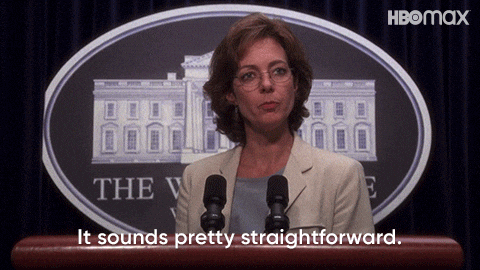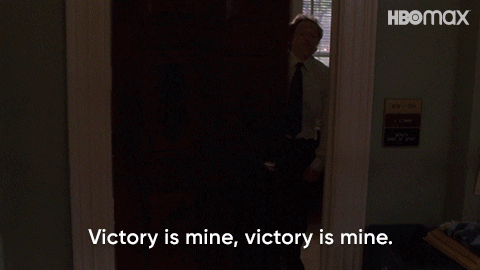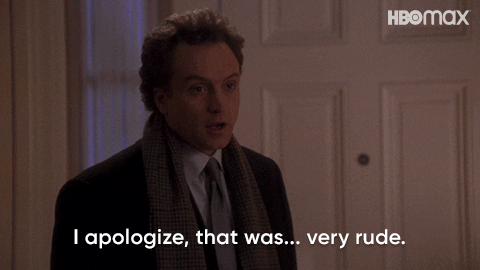The Real Victory is Rest
What The West Wing forgot to tell us about winning — and how we can tell a better story now
Fun fact: In college, I majored in theatre and designed my own degree in Literary Criticism (thanks, Knox College!) to prepare for a career in film, TV and theatre criticism. That career didn’t quite pan out. Life happened. After many career iterations, I became a solopreneur burnout recovery coach and fractional COO instead. And yet here I am — combining all the things I love. This June, I’m letting my inner nerd fly free with a new series exploring how shows like Star Wars: Andor, The West Wing and The X-Files glorify and sometimes challenge grind culture — often in the name of a “good cause.”
⚠️ Spoiler alert: Mild spoilers ahead for all seasons of the NBC series, The West Wing (1999-2006).
Confession: I just watched all of The West Wing in 2024-2025. I embarked on this epic task after finally getting tired of reading allusions to the show I didn’t understand and of faking laughter at inside fan jokes. So many favorite actors are in it. (Hello, Allison Janney and Rob Lowe. 👋) I enjoyed texting my friend Beth — who’s watched the series so many times she can recite it — with my wide-eyed reactions. 😂 I was delighted to have the voices of Joshua Malina and Hrishi Hirway of The West Wing Weekly podcast in my earbuds as hilarious guides.
I’m very glad I got over my initial political cynicism and immersed myself in this somewhat idealistic early 2000s White House drama. I’m glad I came back to the show (after about a month’s break) to finish watching after the 2024 election in which the U.S. elected he-who-must-not-be-named again. I just couldn’t watch an earnest, liberal president and his staff try to do the right thing for a while. But I recovered, watched the ending, and am very glad that I did.
Watching it through a 2025 lens means that many cultural assumptions present more than 20 years ago simply do not hold up — the blatant sexism against the show’s few female characters and the utter lack of characters of color (especially in the early seasons). The other thing that does not sit well with me as a burnout recovery coach is the unabashed and largely un-critiqued glorification of grind culture in the name of a “good cause.”
Why we keep worshiping overwork — even when it’s killing us
The central characters of this show have no idea what healthy work-life balance is. I could cite dozens of times when characters are grabbing their coats off to for some precious time away for for a weekend, only to be dragged back into yet another emergency at the West Wing. Too many times, Donna Moss (Janell Maloney), intrepid assistant to John Lyman (Bradley Whitford), pulls out the pillows and blankets from some hidden closet because the staff is going to sleep on their couches. Let’s not blame these characters or even show creator Aaron Sorkin — they are merely reflecting the toxic cultural pressure to earn one’s entire value through the amount of work you do.
Let me share just one of my favorite and most dramatic examples of this tension between the characters sense of calling to their work and to their families and personal lives.
In Season 2, Episode 17, “The Stackhouse Filibuster,” the White House staff is ready to escape for a rare weekend off — until a filibuster derails a bit of legislation they thought they had in the bag. C.J. Cregg (Allison Janney) won’t let anyone leave, reminding them, “This is democracy at work.”
Their weekend plans? Canceled. Dates, trips to baseball spring training, the family gathering C.J. herself was planning to attend — none of it matters in the face of the greater good. Even C.J., while writing an email to her dad late into the night while still in her office jokes, “If you can wait to turn 70 until tomorrow, that would be great.” Sacrifice is the name of the game. Work comes first. As you’d expect, our heroes and heroines get the bill passed. They cheer, and the score swells to glorify their victory – at the expense of their personal and family time. Not to mention the money spent on rescheduled last-minute flights and nonrefundable hotel rooms.
I’m sure this is what it is like to work in a 24-hour place like the White House. The emergencies never stop coming, and it’s nearly impossible to have healthy relationships with family, friends or your spouse (if you manage to have or keep one) when you work in a place like that.
If we saw this episode from the family’s perspective, we’d see disappointment. C.J.’s dad may be proud of her, but he’s also probably really sad she missed his birthday. The show glorifies pushing through exhaustion, but what if your calling also includes caring for yourself and loving your family?
What happens when the heroes and heroines finally crack — and what we can learn from it
Though the unhealthy grind culture these characters live in is largely un-critiqued during the seven-year run of the series, a few characters have a bit of a reckoning as they approach the end of the Bartlet administration.
Following the tumultuous win of President-Elect Matthew Santos (Jimmy Smitts), Campaign Manager and soon-to-be Chief of Staff Josh Lyman is acting like a raging asshole to most of the staff in Season 7 Episode 19, “Transitions.” There’s a notorious scene in which he screams at Otto, a loyal campaign staffer, to give him his Blackberry (a precursor to smart phones, for those of you who don’t remember.)
Sam Seaborn (Rob Lowe) — formerly of the White House staff who’s come back three years later to consider being Josh’s deputy chief of staff — calmly but very firmly shakes Josh back to what’s left of his senses. Sam — who has apparently been taking vacations and days off during his few years away from Washington — is grounded enough to tell the hard-headed Josh that he will take a vacation or Sam will not be his deputy chief of staff. The episode ends with Josh and Donna — with whom he’s finally become romantically involved — getting on a plane to take his first intentional vacation in 8+ years. I’m not sure a week or two is totally going to improve Josh’s mental health, but at least it’s a start.
Similarly in Season 7, Episode 21, “Institutional Memory,” C.J. Cregg (Allison Janney) who has spent nearly a decade with President Bartlet first as press secretary and then as chief of staff, struggles mightily with a relatively open schedule and just what her next steps are going to be. Her on again, off again, love interest Danny Colcannon (Timothy Busfield) has come back in the picture, and he keeps inviting her to consider having a real relationship with him outside the halls of the West Wing.
Vulnerably, she says to him, ”You said yourself, it's not an accident that this [relationship] hasn't come together. This is who I am. I'm good at my job, Danny. I'm good at working; I'm not good at this.”
By the end of the season, we see her a year or more later, baby in hand, Danny by her side. We don’t see all the messy mistakes she makes on her way to being in a relationship, but she clearly chooses a different path this time.
What if the real rebellion is rest — and the true revolution is a life with balance?
I love that this show has kept finding its way to new generations, inspiring them to public service. God knows we need all of us to hold onto our callings to fight for the greater good. I am grateful at how it melted my cynical heart in this deeply jaded time in my life, helping me believe that there still are some good people out there working in government.
I’m also concerned that shows like this glorify sacrificing for the cause by “powering through,” as if it is the only way to make the change we want to see in the world. Can Josh’s rage-filled eruption at an innocent staff member and C.J.’s exhausted relational confession to Danny teach us that maybe working 24/7 for the greater good is not the way forward? Maybe we need to learn that being called to the greater good also means being called to taking care of ourselves. Hopefully this results in less rage and loneliness at minimum. At most, we might discover that we serve better when we are first serving ourselves.
Struggle to rest? Here are some resources
Let’s take more vacations, share more work with others, set stricter boundaries, and care for our families and friends even when it means stepping away at a crucial work moment.
If you struggle with how to rest, here’s my 🔥 30 Days of Rebellious Rest – a series exploring the seven types of rest with many suggestions of how to use them. I’m also in the early planning stages of developing something I’m calling the “Calm Calendar Club,” coming later this year. 💥 Get on the waitlist to be the first to find out more.
Resources
The West Wing created by Aaron Sorkin
The West Wing Weekly podcast produced by Joshua Malina and Hrishi Hirway









